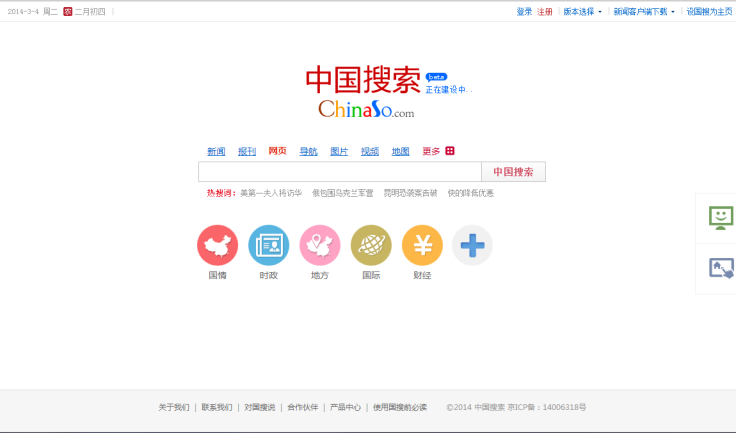China's Government Owned Search Engine 'ChinaSo' Unveiled Amid Increased Internet Censorship Concerns

No Google? No problem. Though China’s Baidu is already the country’s answer to the Silicon Valley-based giant that pulled out of the China market in 2011, a new state-run search engine that was unveiled on Saturday is hoping to compete.
The search engine, ChinaSo, is a platform that was born from the merge of two preexisting search engines, Panguso and Jike, which are rarely used. The site’s beta version, which includes image, video and news-search capabilities, was launched on March 1 with a multicolored logo that bears a striking resemblance to the now-iconic Google (NASDAQ: GOOG) logo.
Unlike Google, however, ChinaSo will be at the hands of China’s government, which is notorious for censoring certain searches on “sensitive” subjects. According to rumors published by multiple local news sources, staff from China’s Communist Party newspaper People’s Daily and Xinhua News Agency will be jointly managing ChinaSo. Sina Tech reports that Xinhua’s vice president, Zhou Xisheng, will serve as the site’s CEO while the deputy editor of the People’s Daily will serve as president.
Even with the government’s backing, ChinaSo faces a tough road in gaining a piece of China’s competitive search engine market. Global Times reported that Baidu is leading the pack, holding 58.33 percent of users, followed by Qihoo and Sogou, with 24 .85 percent and 13.37 percent, respectively.
Initial responses to ChinaSo have not been complimentary. Comments on various tech news blogs and in articles have described the new state-run search engine as a “waste of taxpayer money” and “terrible” in comparison to already existing search portals.
Others are willing to give ChinaSo a chance, but will be using the state-owned site for specific searches regarding official statements. “There is nothing wrong with creating a state-run search engine service,” the commenter on the Sina Tech blog wrote, according to the South China Morning Post. “At the very least, I can use this to find national policy information, and so far the relevant results are much better than commercial [search engines].”
However, some may believe that the new search engine is foreshadowing a tightening control on China’s Internet. ChinaSo’s release comes amid concerns over a new Internet security and information technology panel that will be overseen by President Xi Jinping. Premier Li Keqiang and propaganda chief Liu Yunshan will also be on the panel, serving as deputy chiefs. The formation of the new panel with the country’s top leader at the helm has many of China’s Internet users and bloggers worried that the increased attention would only result in a blow to press freedom and lead to more censorship.
Lu Wei left his senior editor job at Xinhua News when he was offered a position as deputy director of the State Council Information office and head of the State Internet Information Office last year. Many believe Lu was responsible for spearheading the formation of the panel.
“I am not optimistic about the future of Internet freedom in China now that Lu sits on the panel,” one anonymous Beijing-based media professional said to the South China Morning Post. Lu, she says, has a reputation for being a tough enforcer of the Party line.
© Copyright IBTimes 2024. All rights reserved.






















